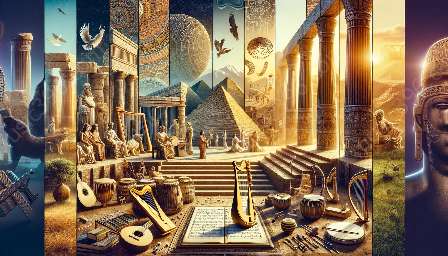Music played a multifaceted and pivotal role in ancient Greek culture, permeating various aspects of society and profoundly impacting religious rituals, social interactions, and educational practices. This comprehensive topic cluster delves into the historical and cultural significance of music in ancient Greece.
The Importance of Music in Ancient Greek Society
In ancient Greece, music was not merely a form of entertainment; it held deep cultural and religious significance, encompassing a wide range of functions and serving as an integral part of everyday life. The Greeks believed that music had the power to evoke and manipulate emotions, stimulate intellect, and elevate the soul, thus influencing individual behavior and communal harmony.
Religious and Ceremonial Functions of Music
Within the realm of religion, music played a crucial role in various rituals and ceremonies, serving as a bridge between the mortal and divine realms. It was believed that music had the ability to appease the gods, communicate with the divine, and facilitate worship. Instrumental and vocal performances were integral components of religious festivals, processions, and sacrifices, aiming to honor the deities and invoke spiritual experiences among the participants.
Moreover, ancient Greek theater, a fundamental aspect of religious and civic life, relied heavily on music to accompany dramatic performances, choral odes, and dance movements. The synergy between music, poetry, and theatrical expressions contributed to the emotional and spiritual impact of dramatic narratives, making theater an immersive and transcendent experience for the audience.
Social and Cultural Context of Music
Beyond its religious significance, music held a prominent place in various social and cultural settings, reflecting and shaping the values, norms, and identities of different Greek city-states. Public and private gatherings often featured musical performances, fostering communal bonding, entertainment, and intellectual exchange. In addition, music was an essential component of symposia, extravagant banquets where elite male citizens engaged in philosophical discussions, socializing, and musical competitions.
Furthermore, music accompanied a wide array of civic events, including sporting competitions, military processions, and public ceremonies, enhancing the ceremonial grandeur and instilling a sense of unity and pride among the participants. The harmonious interplay of music and communal activities reinforced social cohesion and collective identity, contributing to the overall fabric of ancient Greek society.
Educational and Philosophical Dimensions of Music
Ancient Greece placed a strong emphasis on the educational and ethical aspects of music, considering it an indispensable tool for the cultivation of virtuous and well-rounded citizens. The renowned philosopher Plato advocated for the incorporation of music and dance in the curriculum of the ideal republic, highlighting their ability to instill moral values, discipline, and aesthetic sensibilities in the youth.
Music education encompassed the study of musical theory, composition, and performance, aiming to develop not only technical proficiency but also moral character and emotional refinement. The influential role of music in shaping ethical conduct and intellectual development underscored its status as a foundational element of Greek pedagogy and philosophical thought.
Legacy and Influence of Ancient Greek Music
The enduring legacy of ancient Greek music extends far beyond its historical context, permeating various genres, styles, and traditions in the modern world. The innovative musical theories, instruments, and compositions of the ancient Greeks have left an indelible mark on the evolution of Western music, inspiring countless composers, musicians, and scholars across diverse cultural landscapes.
Furthermore, the philosophical contemplation of music's intrinsic nature, its ethical implications, and its profound impact on human experience continue to resonate in contemporary discourses on musicology, aesthetics, and cultural studies. The rich tapestry of ancient Greek music endures as a testament to its enduring relevance and enduring significance in shaping the course of musical evolution and artistic expression.




































